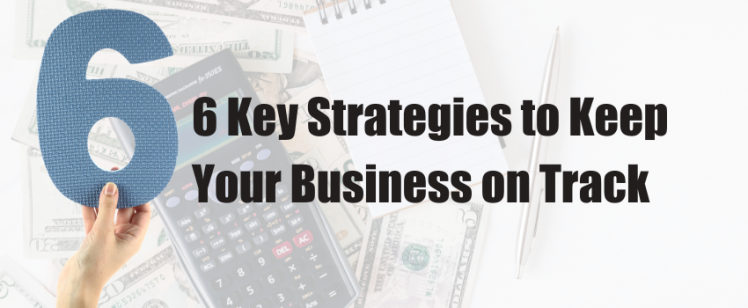-
6 Key Strategies to Keep Your Business on Track
Everyone knows how important it is for a business to maintain best practices for company finances. While faults in customer service or marketing can hinder your business, accounting mistakes can stunt your growth and leave your company struggling to survive.
Small business owners wear many hats, dealing with duties ranging from marketing, to inventory management and everything in between. With the hustle and bustle of trying to stay on top of everything, errors can occur, especially with respect to accounting. But with prudent planning and smart choices, even accounting errors can be mitigated or avoided altogether.
Here are six things you can do to help avoid common accounting mistakes.
- Hire the best Accountant and Bookkeeper you can afford- it will save you money
The do-it-yourself approach is a tough one. And even if you think you are up to it, proper accounting takes time and energy that you could be devoting to other areas of your business.
Setting up a QuickBooks Online account is a good option. This will help you to track everything going in and out of your business. It saves time and headaches.
Not every online financial tool is created equal. As such, it’s important to do your research and find the right software for your business. Remember, the cash your business could lose through poor financial practices isn’t worth the savings you make on cheap or “free” software.
Doing it yourself may work in the beginning stages of your company, but as your business grows, you’ll probably need some help.
If you want an accountant that is qualified and attentive, be ready to pay a premium for those qualities. By paying less for an accountant, you may think you’re saving money, but hiring a subpar accountant can lead to missed deadlines and inaccurate reporting.
Like financial software, competent accountants are worth the extra investment. They have the ability to not only take care of the basics, but they can also offer insight into the proper ways to spend your money and grow your business. On top of that, most professional accountants use QuickBooks to handle their clients’ finances, so if you started with QuickBooks on your own, your new accountant will be able to easily take over your books.
- Get Comfortable Discussing Finances
Finances are hard to talk about but you will need to find an accountant/bookkeeper that you can talk to and just as importantly, understand. They should be able to explain your financial situation in terms that you can understand. Find someone that is patient with your questions and is willing to teach you enough to understand the answers.
Don’t be too proud or afraid to expose your personal lack of knowledge to your accountant/bookkeeper. This is especially important when you’re talking about money, so find someone that you feel is competent and honest enough to give you an accurate picture of your business..
- Control Your Expenses
Reviewing your expenses monthly or more frequently is a good habit to start. As you review, look for expenses that are not essential or that could be reduced by finding another vendor or asking for a discount. Over time, an incidental expenditure of $20 here or $30 there can really add up. An accountant/bookkeeper can help you keep this spending in check.
- Keep Personal and Professional Expenses Separate
When starting a business, the first thing you should do is open a business checking account; this is where all business income should be deposited. Keeping your business income separate from your personal income minimizes the likelihood of errors that are bound to happen when using a single account. It can also help you stay compliant with IRS regulations.
- Choose the Right Accounting Method
Business accounting has two main methods: cash and accrual.
Using the cash accounting method, you record income when it is received and process payment transactions at the time of payment. The cash method deals with the actual flow of cash coming in and out of the business. Most small businesses are run on the cash basis and pay taxes based on this.
The accrual accounting method, on the other hand, differs in that it records expenses and income when the transaction occurs, even if the cash itself has not yet changed hands.
It’s vital to talk with an accountant or tax professional and determine the best accounting method for your business.
- Employee or Contractors?
The IRS classifies workers into two basic categories: employees and independent contractors. There are a lot of differences that go into making that distinction. Make sure you know the difference
- For Employees: You will have to pay payroll taxes on full-time, part-time and temporary employees. This means that you will be responsible for paying a portion of your employees’ contributions to Social Security and Medicare, as well as withholding a portion of their paycheck to pay their federal tax bills.
- For Independent Contractors: As an employer, you likely won’t need to deduct anything from an independent contractor’s pay. Beware, however, that if you control the structure of the work of your independent contractor, the IRS may classify him or her as an employee, which could lead you to pay the IRS and State agencies back employer taxes, plus fines and interest.
More information can be found here on the IRS website about the differences between an employee and contractor.
- (609) 759-5881
- Contact us
